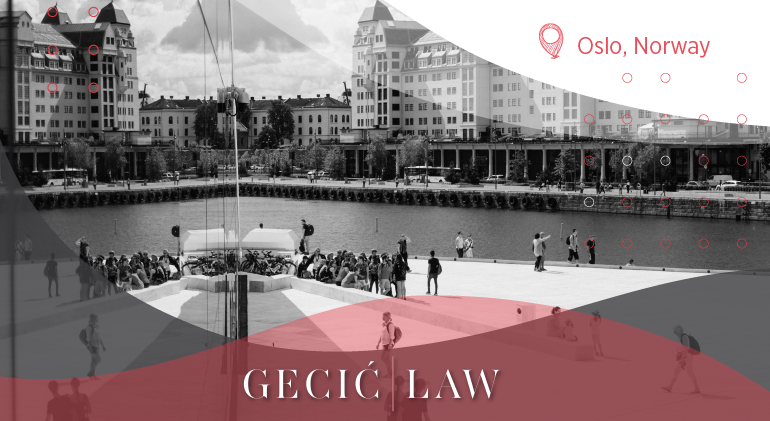

The first post-covid Global Meeting of the elite global legal alliance TerraLex was last week’s highlight as lawyers from 180 member law firms from across the globe gathered in Oslo. Delegates had the opportunity to learn, collaborate and network with their colleagues in a unique series of activities and a relaxed collegial atmosphere. The Gecić Law team took to the center stage, as for the first time the alliance built its annual meeting around a single theme, choosing one of the hottest topics in the legal world today – ESG: Environmental, Social, and Governance. The gathering took a multifaceted approach to the theme covering the full array of risks, opportunities, and new responsibilities ESG brings to businesses and the solutions the legal industry can contribute with.
Gecić Law’s founding partner Bogdan Gecić was invited to host and moderate a key panel discussion on ESG Opportunities and Risks for Clients in the Global Supply Chain. He was joined by colleagues Lee Ying Ying, partner, Regional Banking and M&A at Kelvin Chia Partnership, Nils Christian Langtvedt, partner at Advokatfirmaet Hjort DA, and Lee Smith, of counsel, International Trade & National Security at Baker Donelson.
The discussion was intriguing as the panelists delved into the different key developments and ramifications of ESG on international trade and supply chains from the context of their markets and continents, summed up in a truly global perspective. They also shared their first-hand practical experience with ESG from the perspective of their work with clients in diverse areas.
Lee Smith gave an example of recent increased SEC enforcement when it comes to ESG, both in the US and abroad, through the example of its prosecution of Brazilian mining giant Vale for greenwashing their non-financial reports, which allegedly lead to a tragedy with many victims. In the same vein, he also spoke of the new set of SEC rules on the naming and disclosure of investment funds, which will require that “green” investment funds allocate at least 80% of the assets as their name suggests. To learn more about these topics, click the link. Lee also mentioned the Forced Labor Act, where the US customs may stop the imports of any goods failing to provide proof that forced labor has not been used in the production.
Nils Christian Langtvedt discussed the new Norwegian Transparency Act which prescribes that any company with a turnover of above EUR 7 million and more than 50 employees must conduct human rights due diligence across its supply chain and other partners making sure that human rights have not been violated by businesses they cooperate with. The Act is stricter than what is applicable in the EU and encompasses a far greater number of businesses, while details of the implementation remain unclear.
Drawing on his vast advisory experience in the area, Bogdan spoke about the EU’s historic Fit for 55 legislative package, designed to cut carbon dioxide emissions by 55% by 2030. He specifically focused on the EU’s Carbon Border Adjustment Mechanism (“CBAM”) which is likely to represent a tectonic shift in international trade, affecting supply chains around the world. To prove the point, Bogdan surveyed the audience on the production of the products that would fall under CBAM and then asked how many of the countries had national carbon taxation systems, as a precondition for CBAM exemption. As the results were expected, he stressed that exporters to the EU had three years to prepare and that law firms must take their clients through the process as global awareness of these important changes is still relatively low. If unprepared, CBAM is likely to reduce the competitiveness of businesses and entire economies, especially in regions that conduct most of their foreign trade with the EU, such as the Western Balkans. Except for Switzerland and a few other non-EU countries, very few countries have a carbon pricing system in place that is likely to be recognized by the EU.
Explaining the situation in Asia, Lee Ying Ying said that although many companies have parts of their supply chains in Asia, knowledge of the changes ahead is quite low and that Asia is lagging. This is due to the social and legal diversity of the continent, where currently only Singapore has a carbon pricing system in place.
A lively discussion ensued among participants and the audience about several issues, including the viability of CBAM enforcement, the practical effectiveness of the mechanism as a means of reducing carbon dioxide emissions, possible circumvention of CBAM and expected effects on consumer prices.
“The discussion was invigorating as we all realized how much work needs to be done to prepare our clients for what is coming, and we do not have much time. This is a massive opportunity for the legal profession. That is why TerraLex is perfectly placed for making multijurisdictional work in ESG its unique selling proposition,” Bogdan said.
Gecić Law launched its ESG practice in September 2021 as the first independent law firm in the Western Balkans to offer services in this increasingly important area.
Terralex is a global association with a mission of helping member firms serve their client’s legal needs and business interests through a worldwide network of quality law firms that meets high professional standards. Gecić Law is the exclusive member of TerraLex for the markets of Serbia and Montenegro